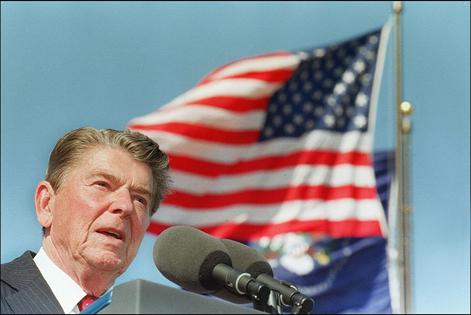Reagan’s great America shining on a hill twisted into Trump’s dark vision of Christian nationalism
Published in News & Features
In August 1982, Ronald Reagan’s father-in-law was dying. Nancy Reagan’s beloved dad, Loyal Davis, was an atheist – a troubling fact to the 40th president. So Reagan penned a private, handwritten note in which he recounted how the prayers of colleagues and friends had cured him of a painful stomach ulcer.
Giving hope for what lay beyond, Reagan entreated the older man, “We’ve been promised this is only a part of life and that a greater life, a greater glory awaits us … and all that is required is that you believe and tell God you put yourself in his hands.”
For decades, some of Reagan’s critics have questioned his religiosity, noting he rarely went to church. But the missive to his father-in-law reveals a deep and heartfelt faith. That faith also factored heavily into his political stands and policies, as I discuss in my book “Righting the American Dream: How the Media Mainstreamed Reagan’s Evangelical Vision.”
In recent years, Donald Trump, another former president and the current Republican presidential candidate, has often spoken about his faith, posing for photo ops with right-wing preachers and praising his “favorite book” – the Bible.
The latest such demonstration was a video in which Trump promoted sales of a pricey US$59.99 version of the Bible. “Let’s make America pray again,” he urged viewers. “As we lead into Good Friday and Easter, I encourage you to get a copy of the God Bless the USA Bible.”
While Reagan and Trump – two of the most media-savvy Republican presidents – used religion to advance their political visions, their messages and missions are starkly different.
In my book, I explain that underlying American politics is a religious vision that links citizens to civic values. The most prevalent vision is that God blessed America and tasked its citizens with spreading freedom and democracy. It’s an idea that has undergirded Americans’ patriotism and inspired American domestic and foreign policies for decades.
Reagan telegraphed belief in a God-blessed America by describing the United States as “a shining city on a hill.” Reagan flipped the original meaning of a Biblical phrase from a 17th century Puritan sermon. In Matthew 5:14, Jesus warns that the world will judge whether or not his disciples, a symbolic city on a hill, stick to their ideals. By adding “shining,” Reagan sanctified American exceptionalism and the United States’ role as a global model of freedom.
Once elected, Reagan sought practical ways to apply his faith in freedom, which, like many evangelicals, he believed came from God. By cutting taxes, ending industry regulations and privatizing government functions, he hoped to give individuals more economic and political freedom.
Reagan’s love of freedom also fueled his hostility to the Soviet Union. He labeled its communist government “an evil empire,” because it denied its citizens freedom. Casting a geopolitical stance as a cosmic battle between good and evil, Reagan made defeating communism a religious calling.
...continued








Comments